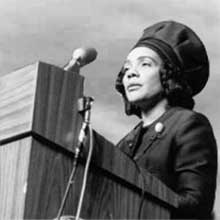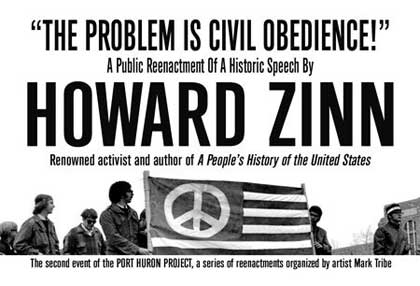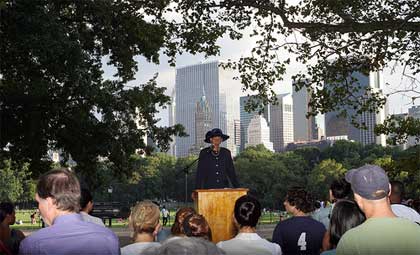 The Port Huron Project is a series of reenactments of protest speeches from the New Left movements of the 1960s and '70s. Each event takes place at the site of the original speech, and is delivered by a performer to an audience of invited guests and passers-by. To reach a wider audience, videos of these events are distributed on DVD and posted online. The project is named after the Port Huron Statement, the manifesto of the Students for a Democratic Society (SDS), a student activist movement formed in 1962.
The Port Huron Project is a series of reenactments of protest speeches from the New Left movements of the 1960s and '70s. Each event takes place at the site of the original speech, and is delivered by a performer to an audience of invited guests and passers-by. To reach a wider audience, videos of these events are distributed on DVD and posted online. The project is named after the Port Huron Statement, the manifesto of the Students for a Democratic Society (SDS), a student activist movement formed in 1962.
The first event in the PHP series, Port Huron Project 1: Until the Last Gun Is Silent, took place on September 16, 2006 and was based on a speech given by Coretta Scott King at a peace march in Central Park in 1968.
The next re-enactment will take place on Saturday, July 14, 2007, at 5 p.m. in the Boston Common park, an actor will deliver a speech given by Howard Zinn at a peace rally in May 1971. Zinn was arguing for the necessity of civil disobedience to protest the war in Vietnam and called on Congress to impeach the president and vice president of the US for the �high crime� of waging war on the people of Southeast Asia. The performance, titled Port Huron Project 2: The Problem is Civil Obedience.

The Port Huron Project is organized and curated by Mark Tribe, i asked him a couple of questions about the projects:
Why do you think it is important to reenact protest speeches from the '60s and '70s? Is our decade not protesting enough? Have we lost something?
I think we have a different, and perhaps diminished, sense of what's possible today compared to the '60s. In his speech at the March on Washington in 1965, Paul Potter talked about changing the system. We protest the war in Iraq, or the WTO, but it's hard to imagine that we could really change things in a radical way: put an end to the military industrial complex, replace consumer capitalism with another form of economy, or achieve true democracy. Back then, people seemed to be able to imagine a radically different future. I think it's vitally important that we recapture some of that utopian spirit.

How do you choose the speeches you are going to reenact? Do they have to echo a particular current event or is the choice driven by other reasons?
Most of the speeches talk about Vietnam and link it to domestic issues such as poverty and racism. I do see uncanny parallels between Vietnam and Iraq, and although more progress may have been made on social justice and liberation, those issues are very much alive today. So in choosing speeches to reenact, relevance is definitely a big factor. Other considerations are the quality of the speech and the location--for the purposes of this project, they have to have been delivered at a public protest.
Thanks Mark!
A list of historic protest speeches has been compiled.

